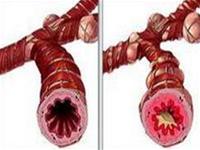Complications of bronchial asthma
Asthma (HPQ) is a common disease. Complications of HPQ are very severe, but patients rarely pay attention to these complications.
In winter - spring, cold weather is a favorable condition for complications of asthma to occur, so people need to know to prevent it.

Normal lung bronchial images and pulmonary bronchial images in bronchial asthma patients.(Photo: Youth)
According to the World Health Organization (WHO), asthma is a threat of humanity, one of the most common chronic diseases. Currently there are about 300 million asthma people in the world, this figure is expected to increase to 400 million by 2025.
Southeast Asia is a region with high prevalence of asthma: Malaysia 9.7%, Philippines 11.8%, Thailand 9.2%, Singapore 14.3%, Vietnam about 5%. Death from asthma each year has 200,000 cases, Vietnam has 3,000 cases.
Asthma progresses in episodes, after each episode, the disease is more severe and dangerous, is a disease or causes complications such as:
Pulmonary collapse: More than one third of children are in hospital because of asthma complications. Pulmonary collapse of one lobe or multiple lobes is a complication of about 10% of patients admitted to hospital. When asthma is stable, the collapse of the lung will go away.
Bronchial infections: Usually a complication in patients with chronic asthma. In the case of seasonal changes, cold spells, sudden changes in the day, high air humidity is a favorable condition for bacteria and viruses causing inflammation of the ear, nose and throat, lower respiratory tract, causing the flu phase worsens asthma symptoms. Patients with fever, dyspnea increased, have much phlegm. Blood and polymorphonuclear neutrophils increased. Sputum tests show leukocytes degenerate and bacteria, sometimes TB bacteria are found.
Multi-lobed alveolar dilatation: The elasticity of alveoli in asthmatic patients decreases with time, low exhalation, increased volume of sediment. Also called emphysema. Patients who have difficulty breathing when exerting themselves, do not even blow the match that burns a little away. Coughing sputum, the lips and head are cyanotic. Knocking the lungs hears the sound very echoing, the alveolar murmur decreases, sometimes loss Far away heart. Xquang: the lungs are too bright, the diaphragm is low, the heart is teardrop shaped, the angle of the diaphragm is horizontal, the ribs are horizontal and wide.
Pneumothorax, central air spill: Meet at about 5% of chronic asthma. Due to enlarged alveoli, dilated alveolar region, sparse blood vessels, poor feeding, increased pressure in the alveoli. When working hard or coughing, the alveoli wall is easily broken. Often clinical signs are rarely frantic, so a lung X-ray must be detected. When there is an air spill, it is necessary to deal with emergencies. Bilateral pneumothorax is the cause of sudden death in bronchial asthma.
Chronic wasted heart: In 5% of chronic and severe asthma patients. Showing dyspnea on exertion, persistent cyanosis, pain in the right lower quadrant, the liver may be large or streaked. ECG: Fast sinus rhythm, sharp P waves. S waves dominate in the precordial leads. Asthma has the ability to restore respiratory function, so the time leading to the chronic heart of each patient varies, can last 5 years, 10 years, even longer.
Concurrent respiratory arrest has brain damage: Due to prolonged respiratory distress, leading to brain hypoxia. At cardiac arrest, respiratory arrest in severe asthma. These cases often have sudden suffocation, leading to increased blood CO2 and mixed acidosis, which eventually leads to coma and death.
Respiratory failure: Usually only in hospitalized patients, severe acute asthma or malignant asthma. Patients with dyspnea, persistent cyanosis, sometimes stop breathing, support breathing machines. This is also one of the causes of death of asthma.
Asthma is a burden for society, according to OMS, asthma causes more human cost than the cost of two critical diseases of the century, tuberculosis and HIV / AIDS combined.
Complications of bronchial asthma are even more severe. So people with bronchial asthma and everyone in society need to have an understanding of how to treat asthma right from the early stages, as directed by their doctor, towards controlling asthma. , reducing shortness of breath during the week, during the day is contributing to effectively controlling the complications of asthma.
When having a severe asthma attack or suspected asthma complications, it is urgent to bring the patient to the hospital emergency department for timely examination and management.
- 4 ways to deal with asthma attacks - bronchial asthma
- 8 common questions about asthma
- Orthopedic technology with bronchial heat and asthma
- Be careful of asthma attacks in Hanoi
- 6 tips to help prevent bronchial asthma during the season
- Helicobacter Pylori bacteria helps prevent asthma
- Bronchial asthma increased sharply
- New findings on asthma
- Asthma - things to know
- Thermoplasty Bronchial - New method for treating asthma
- The concentration of allergens at an increased place leads to asthma
- Symptoms of asthma
 Green tea cleans teeth better than mouthwash?
Green tea cleans teeth better than mouthwash? Death kiss: This is why you should not let anyone kiss your baby's lips
Death kiss: This is why you should not let anyone kiss your baby's lips What is salmonellosis?
What is salmonellosis? Caution should be exercised when using aloe vera through eating and drinking
Caution should be exercised when using aloe vera through eating and drinking What is asthma (bronchial asthma)?
What is asthma (bronchial asthma)?  The diet of pregnant women increases the risk of asthma in children
The diet of pregnant women increases the risk of asthma in children  Cats are drugs that prevent asthma for children
Cats are drugs that prevent asthma for children  Free examination for 1,000 people with asthma
Free examination for 1,000 people with asthma  Breeding dogs helps you fight eczema eczema and reduce asthma
Breeding dogs helps you fight eczema eczema and reduce asthma  4 ways to deal with asthma attacks - bronchial asthma
4 ways to deal with asthma attacks - bronchial asthma 